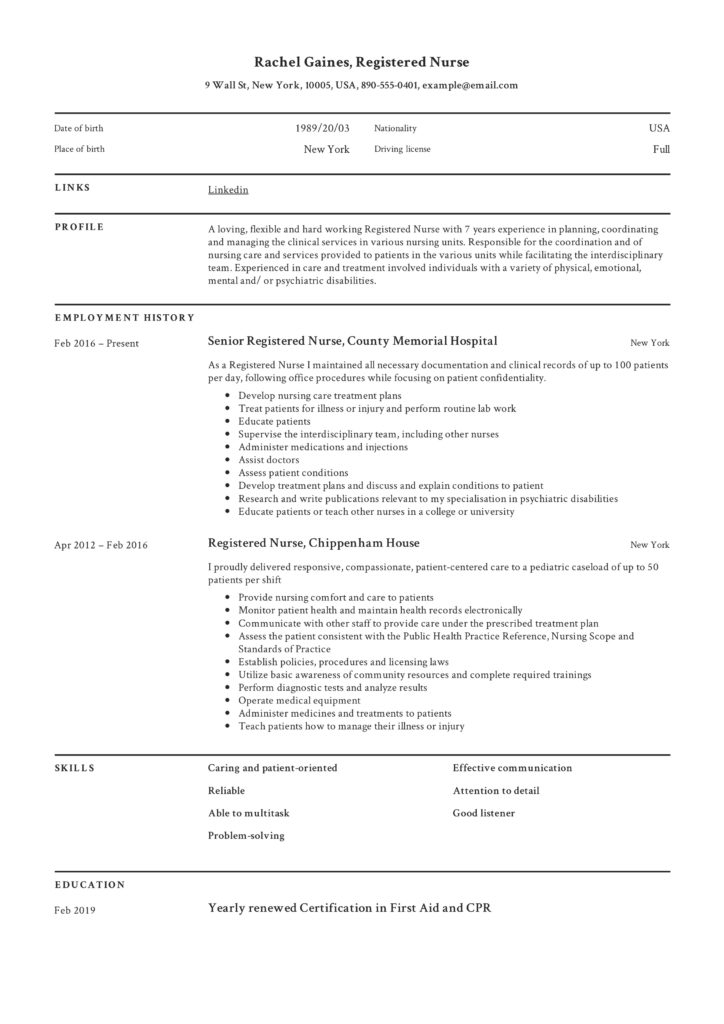
Are you seeking a rewarding career as a Registered Nurse in a high-growth field? Now is a great time to hunt for your dream job. Our first-class Registered Nurse resume samples are the best starting point to make sure that your resume stands out from the crowd. After all, your resume is the first impression you give to the hiring organization.
Do you want to make sure that your resume will get you that interview? We will walk you through it in detail in this How to make a Resume Guide for a Registered Nurse.
What you can read in this article
Or download these examples in PDF at the bottom of this page for free
No matter how short or long you have been working as a Registered Nurse, there are a few key things that employers need to know to make sure you are a good fit for their team.
As a Registered Nurse, you’ll play an essential role in promoting health and wellness, and help improve the quality of life of people. Your responsibilities involve caring for all kinds of patients, but it will vary depending on your specialization and the organization. The first thing to highlight in your resume is your experience with a diverse patient population and your specialties such as neonatology, critical care, gerontology, and pediatrics.
Be as specific as possible and use the job description as your guide. Do you have the required responsibilities and qualifications? By mentioning the same words, you speak their language which will lead to recognition. Don’t forget to include this in your summary at the top of your resume, as well as within each position description.
Next, employers are not only looking for skilled Registered Nurses, but they also want to add passion, dedication and commitment to their team. The promise of most healthcare organizations is to provide compassionate care that respects the dignity and rights of the patients. Show your compassion as a Registered Nurse. For instance, mention your role in transforming healthcare and millions of lives as a result and the values you embrace and the passion you bring to achieve this.
Lastly, as a Registered Nurse, you may be required to respond to critical issues on a 24/7 basis. You are frequently required to stand, walk, lift heavy, push, pull, stoop, crouch, twist and reach. You also will be exposed to blood or other body fluids, fumes or airborne particles and toxic or caustic chemicals. Employers need to be sure about your compassion and dedication to help others despite the hard work, long hours and physical parts of the job.
With the little time, hiring managers have to go through all the resumes, you want yours to stand out early on. Write the most critical information first to capture their attention: your value. Keep your career objective concise and to the point. If it catches their attention, they will most likely read the rest of your resume too.
Start your career objective with your years of experience in healthcare, your line of work and your primary responsibilities. Always use the job description as your guide when deciding which responsibilities to add. For instance, if the vacancy emphasizes expertise in making nursing diagnoses and experience with individuals with psychiatric disabilities, mention the same words in your objective. The more you sound like them, the better fit you will seem.
Next, add a line that showcases any outstanding qualities that will help the company, the team and of course the patients. A hiring manager would be interested in your “strong communication skills” and “the ability to use logical reasoning for simple and complex problem-solving.” Include these qualities also in the professional experience section.
Lastly, close with your educational degrees and any certifications you may have that are pertinent to the job.
Example 1
“A caring and curing Registered Nurse with 5 years of clinical experience in acute care. I have a desire to improve the well-being of patients and my focus is caring for every patient the way we would care for our family members. I strive to provide patients with services designed to achieve quality care and quality of life by combining care and cure treatments.”
Example 2
“A loving, flexible and hardworking Registered Nurse with 5 years experience in planning, coordinating and managing the clinical services in various nursing units. Responsible for the coordination and of nursing care and services provided to patients in the various units while facilitating the interdisciplinary team. Experienced in care and treatment involved individuals with a variety of physical, emotional, mental and psychiatric disabilities.”
Depending on your career stage and educational level, the following proven foundational duties and skill sets would be expected within an applicant’s resume.
Your experience is more than a list of duties you performed that match the job description. If you want to set yourself apart from other applicants with similar experience, you need a different approach.
Try this different approach by mentioning action-packed statements on what sets you apart, what you are most proud of or what you have accomplished in your previous roles.
Flat, simple duty:
Accomplishment statement:
Can you include specific numbers in your CV? Try to be as accurate as possible:
1989 -1993 Ridgefield High School, High School Diploma Ridgefield, NJ
Maintained an 85 average over five years and I achieved a B or better in Biology, Chemistry, and Algebra
1993 – 1997 Bachelor of Science in Nursing, Long Island University, NJ
Gained knowledge about meeting the health needs of individuals, families, communities, and populations. College GPA of 3.0
1997 – 1999 Master of Science in Nursing, University of San Francisco
Advanced within the field by gaining experience to develop and manage patient care plans.
Although the Registered Nursing field requires specific educational and technical skills, employers also look for other skills. These so-called soft skills are the type of skills that make you a good employee and colleague. Incorporate these into your career objective and your accomplishment statements.
All these downloads are free and in PDF. Do you wish to make all these designs yourself? Then use the resume build tool. Its easy, fast en creates stunning resumes for you:

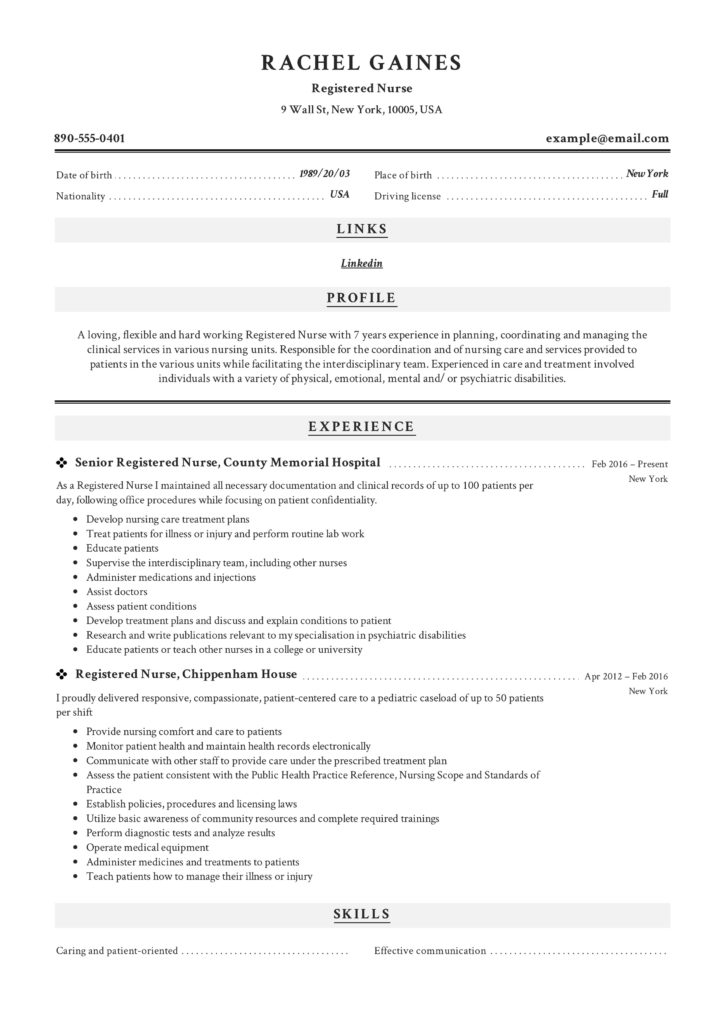
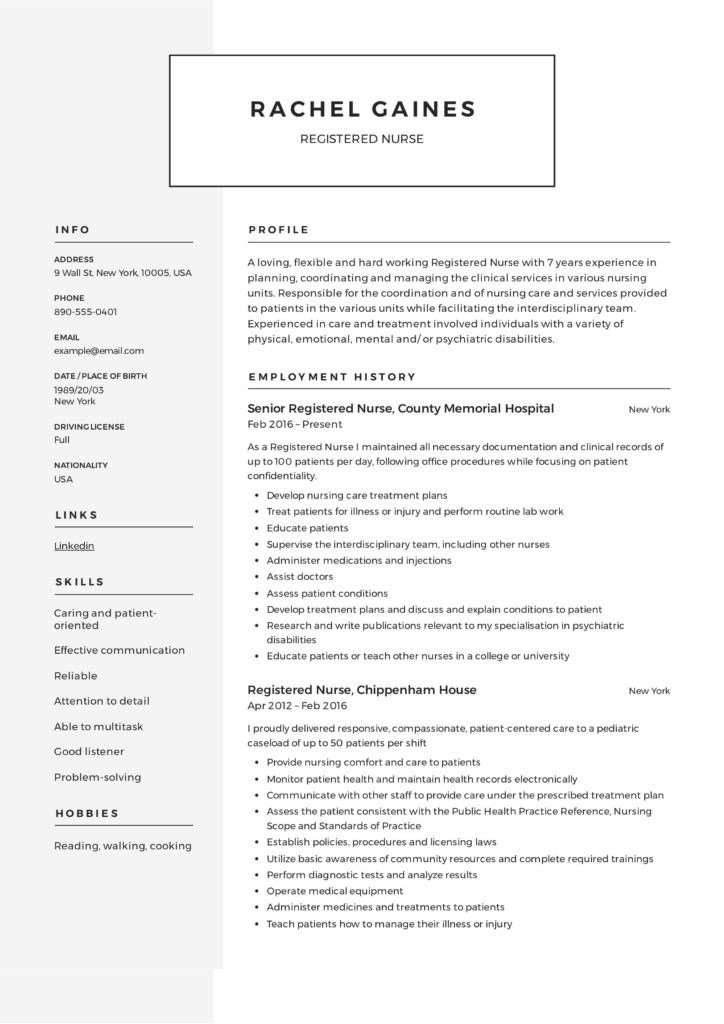
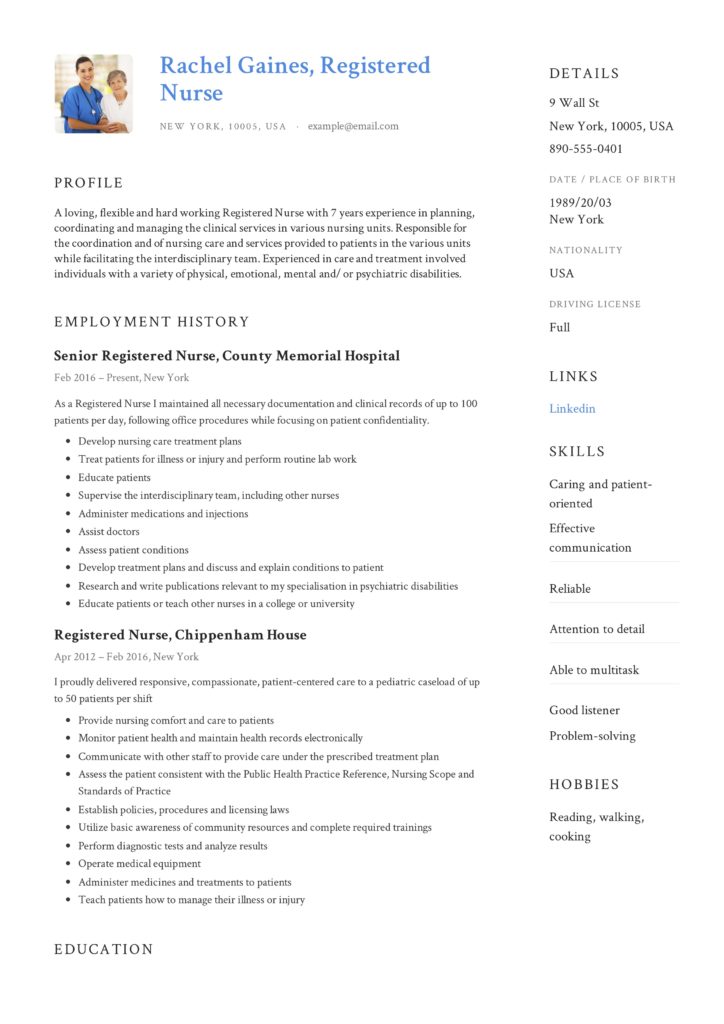
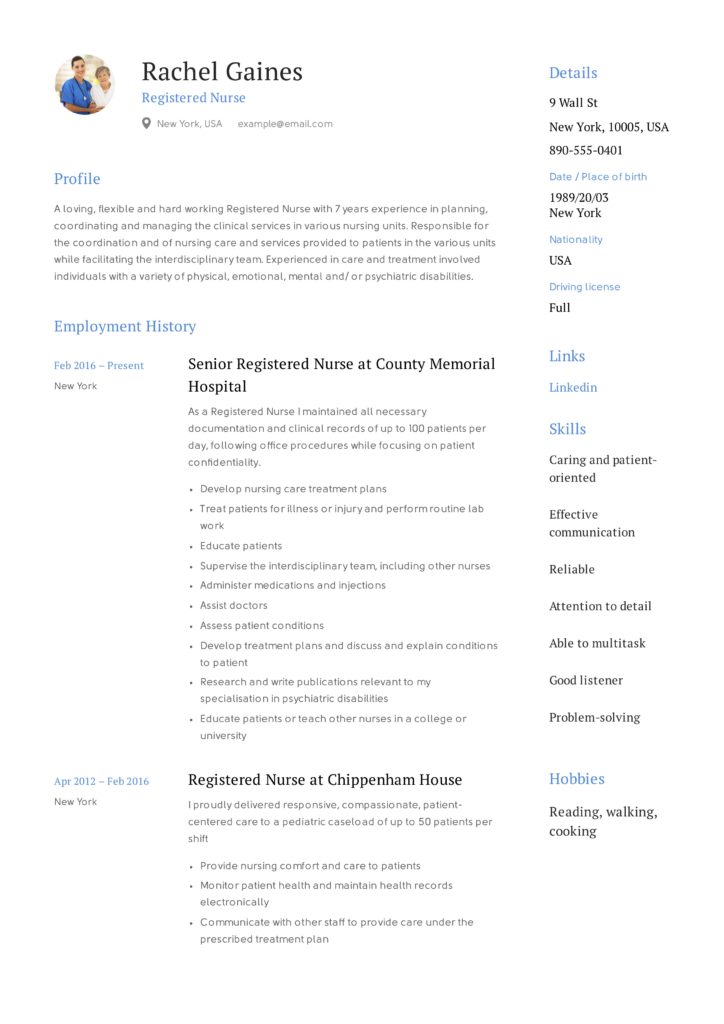
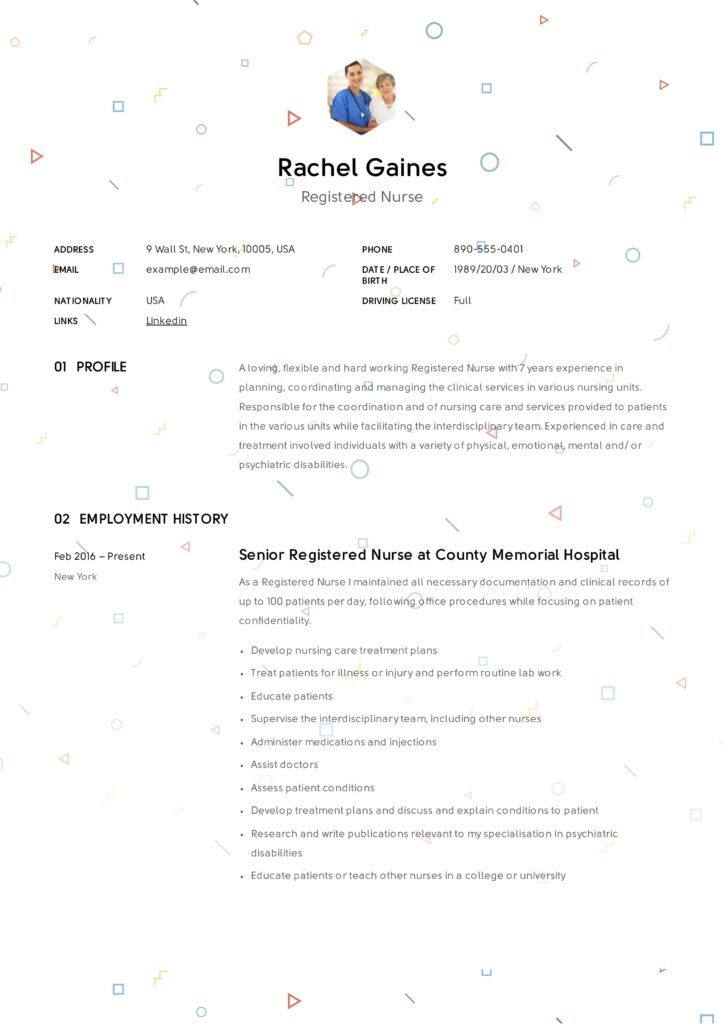
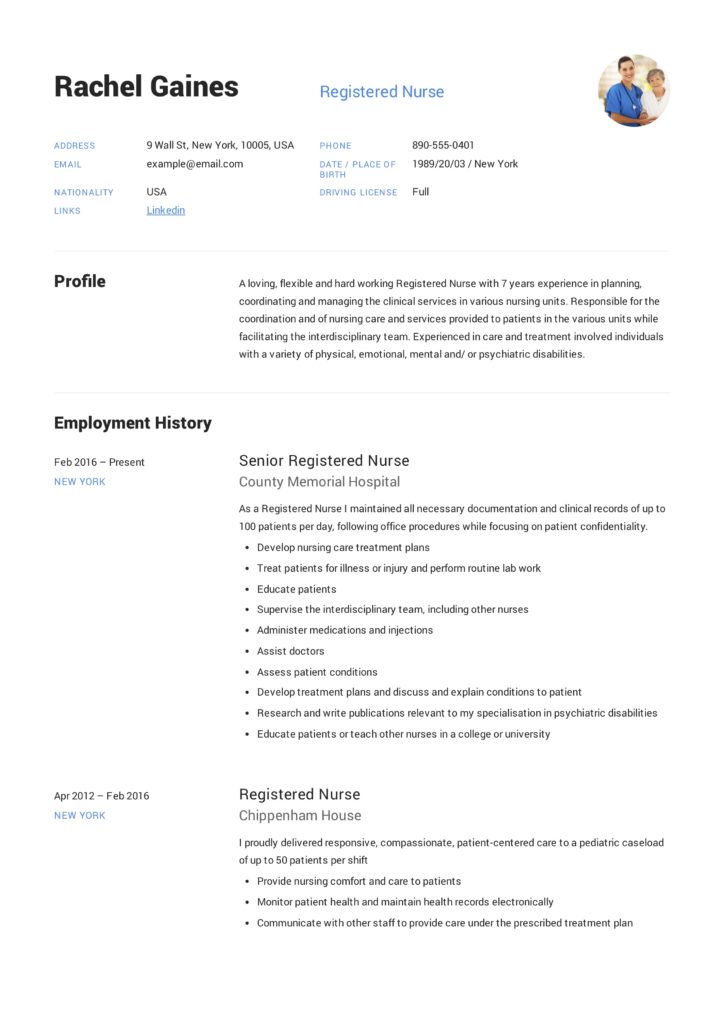
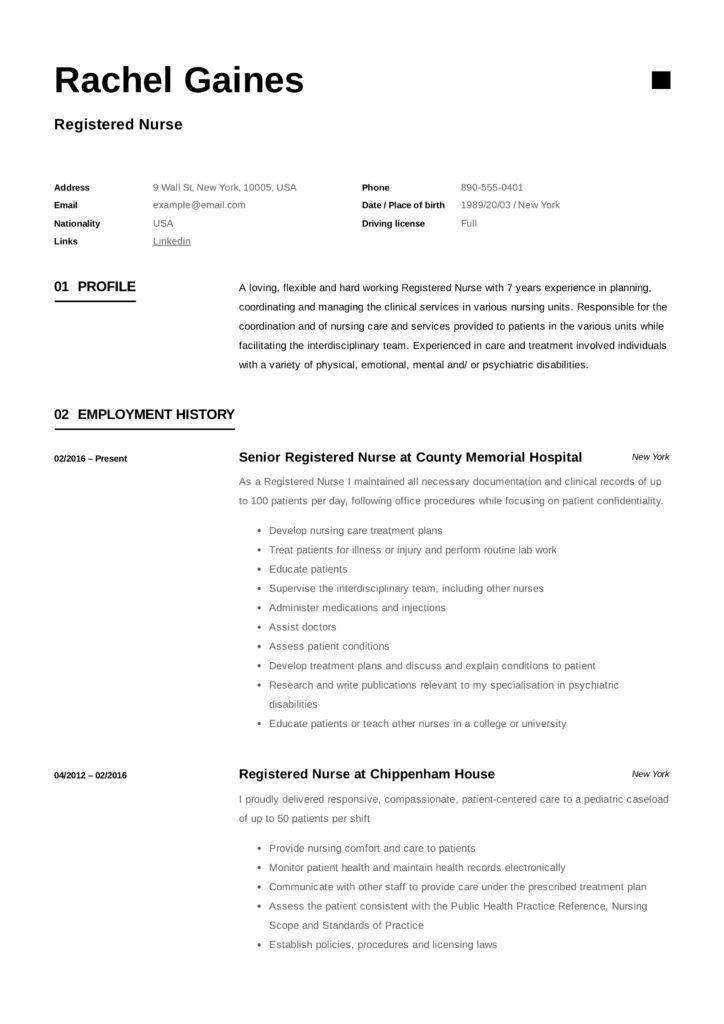
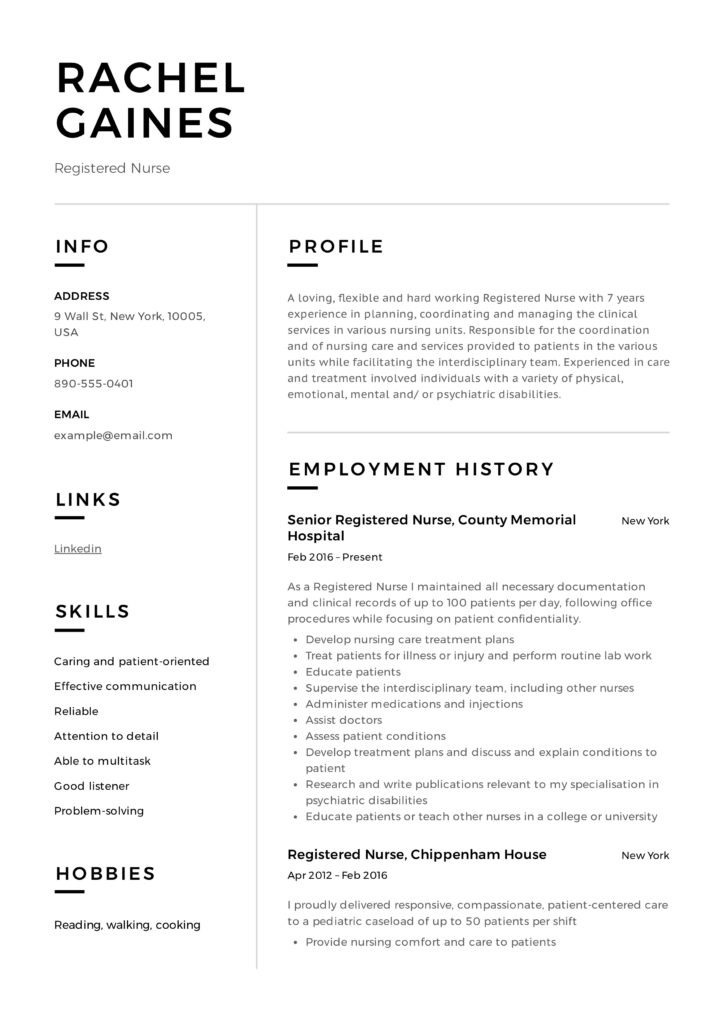
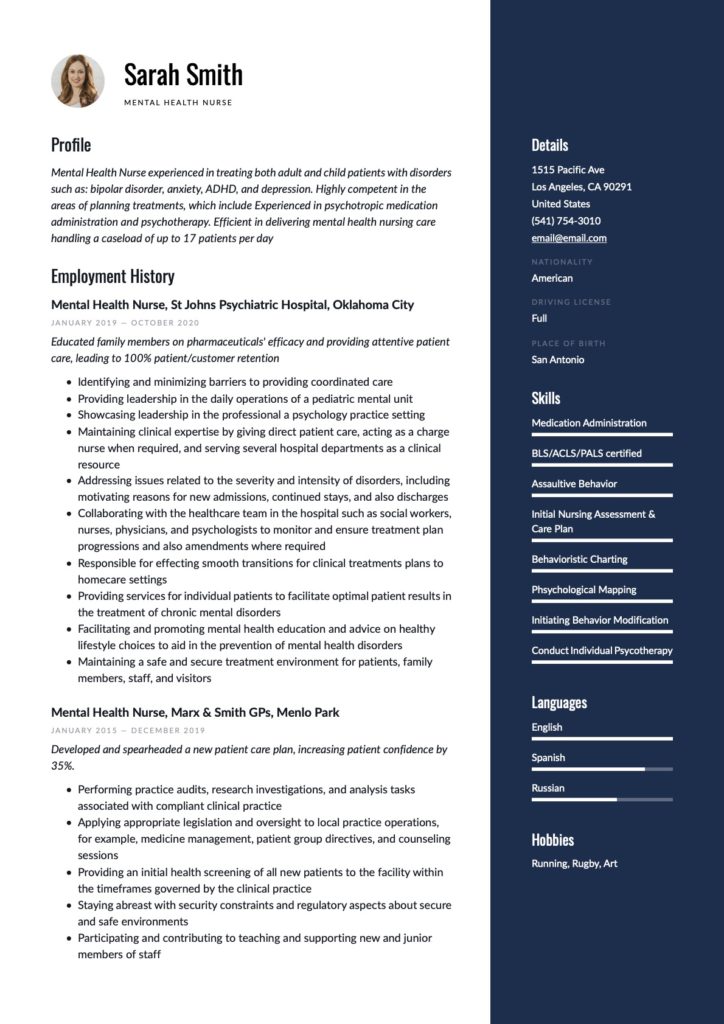
| ICD-9 | ICD-10 | CPT coding |
| Nursing Licensure Exam (NCLEX) | Basic Life Support BLS | CPR certification for the Healthcare Provider |
| Organized | Administred | Applied |
| Assessed | Educated | Planned |
| Provided | Observed | Monitored |
| Coordinated | Prioritized | Cared |
Sector: Healthcare
Person type: Carer, friendly, steady, professional
Education levels: Associate Degree in Nursing or a Bachelor of Science in Nursing (BSN), optional a Master of Science in Nursing (MSN) degree
Salary indication: From $ 40.000 to $ 110.000 per year
Labor market: Great perspective
Organizations: Hospitals, outpatient facilities, rehabilitation centers, nursing homes, dialysis centers, home healthcare agencies and physicians’ offices.